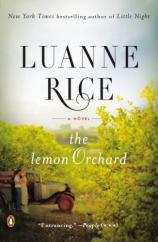Excerpt
Excerpt
The Lemon Orchard

PROLOGUE
February 2007
This is how I picture it: Eleven o’clock that cold and sunny morning, she is behind the wheel, hands in the two-and-ten position because she’s a good girl and that’s the way her father, sitting beside her holding the large black coffee he’d bought at Kendall’s, likes her to drive, and she’s taking care because she doesn’t want him to spill it and scald himself. The station wagon is twelve years old, and if she looked in the rearview mirror she could see where we used to buckle her car seat, and it smells of dog.
Bonnie Blue, our seven-year-old and the latest in a long line of blue-merle border collies, rides with me because she’s still rambunctious and likes to nuzzle the driver’s ear from the back seat, and Peter and I worry she might distract Jenny. Bonnie and I are two miles behind, with one last stop to make, to pick up the chocolate cake at Hoffman’s Bakery, where Viola and Norma have decorated it with goalposts and a fifty-yard line and know to spread raspberry preserves between the layers because that is Jenny’s favorite.
My daughter: Jenny Hughes. She is wearing the bulky Nordic sweater, endearingly lopsided, she knit for Timmy from yarn that still contained bits of burrs and brambles from the sheep’s wool, and it’s so Jenny to be wearing it, just two days after he gave it back to her as part of the breakup, along with her telescope and dog-eared copy of H. A. Rey’s The Stars.
The February day is frigid but bright, and although there’s plenty of snow left from last week’s storm, the roads are clear of ice. Jenny is thinking of the party. She and I don’t care about watching sports but Peter played football at Brown, and every year we go all-out for the Super Bowl. Jenny loves to cook, and together we’ll make chili, Buffalo wings, and guacamole. Last year Timmy came over, and the two of them huddled on the couch whispering and laughing, surrounded by Peter and our friends; I don’t think I watched a full minute of the game, I was so taken by the sight of my daughter in love.
Jenny was sixteen in November, her license is new, and she brings her sense of responsibility to driving the way she does everything else. Straight A’s last semester, a talent for the violin, a blue ribbon in last summer’s horse show, caring for our animals, such good-heartedness, and a head-down pure-hearted determination to go to Brown University like her parents, and I wonder if her choice is a way of trying to hold us together, to remind Peter and me of where we met, and I know she feels bad for leaving the house angry this morning, calling me a hypocrite for inviting people over and entertaining relatives just when Peter is planning to move out. My aunt and uncle from California are staying with us; they are in Connecticut because he’s a professor, guest lecturing at Yale, where I am an adjunct professor of cultural anthropology. Jenny is afraid that they have picked up on the tension and are judging Peter.
So there she is, driving home from the barn along the Shore Road, past the marsh brown and glistening, the creeks frozen over, pure white in the sunlight, her father beside her sipping coffee, telling her how well she rode that morning, how she kept her elbows in and heels down and took Gisele over the jumps.
Peter and Jenny adore each other and have since her birth. At night, as an infant, when she’d wake up crying and refuse to sleep, she’d quiet only when he would cradle and walk her, singing her made-up songs as he carried her back and forth across her room overlooking the meadow, that single stately elm framed in the window, ghostly in moonlight.
And even those years when Jenny was ten and eleven, and I finally went back to school for my master’s, taking classes in New Haven, studying and writing about the anthropology of movement, my books and papers spread out on the dining room table every night, Peter would come home from the office and he and Jenny would take dinner into the den and eat in front of the TV, laughing, Jenny shrieking; they both loved comedies and cartoons, especially French ones—Asterix and Tintin were huge in our house.
She drives toward home and the meadow, gleaming with crusted snow, the road straight and clear, no traffic in either direction, pavement sanded and clear of ice, tree branches interlocking overhead and throwing morning shadows, and her elm—she thinks of it as hers—comes into view. Shore Road takes a sharp left, a boomerang bend, just where our driveway veers off to the right.
Ancient stone walls built by Connecticut’s settlers, arrived from England in the 1600s—evidence, as if we need more, of migration and movement, and how the history of the world is made up of people leaving one place for another, looking for more food, religious freedom, a better life—line the way; when she was little she loved to walk to and from the bus stop on top of the walls, and sometimes we’d hide messages for each other in a lichen-bound crevice that we called our mailbox. She remembers our secret hiding place, the shivery pleasure of finding a note, and she is wearing Timmy’s sweater, the smell of him inseparable from the feeling of being in love, and in that instant she steps on the gas.
The sunlight bounces off the snow, off bright mica and quartz threaded through the granite walls, blinding her for just a second. The road is clear, she knows the way, she is such a good driver, her father is with her, he taught her to drive himself, she would never hurt him, never hurt herself, she loves her family, she loves her life, so there is no explanation.
Ten minutes later Bonnie and I meander along, finished with our errands. We still have a few hours before friends will show up to watch the game, and I’m eager for time with Jenny—her father had the morning, and I’ll have the early afternoon to nurse our child and her broken heart, to just be with her because I’m smart enough to know that words don’t help, there’s no explaining that everything will get better, that she’ll heal, that time will pass and the day will come when it doesn’t hurt so much.
Black Hall is a small town, and when you hear sirens your stomach drops because you’re pretty sure whatever it is will affect someone you know. Driving along Shore Road, I slow down to let the fire truck pass. Bonnie, in the back seat, paces back and forth. I tell her to calm down, everything’s okay, we’ll be home in a minute. I flip on the signal light, to veer off the main road and head toward our driveway, and see the burst of flashing lights.
Some thoughts are too unbearable to allow. I see the town constable gesture for traffic to turn around, go back the other way, and I roll down the window to tell him I live here, and still, I won’t let myself think that this accident belongs to us. But Bonnie is barking, and she knows, and when the constable recognizes me and approaches the car with that look in his eyes that no human being wants to see, my heart stops because my heart knows.
I open the car door, he tries to block me but nothing in this world could hold me back, I am right behind Bonnie running to the front of the long line of police cars, fire engines, and ambulances. I hear someone say, She didn’t even hit the brakes, she had to be going fifty, and someone else saying, Shut up, that’s her mother. The sun glistens off the snowfield and Long Island Sound, but it doesn’t blind me, I see everything, and my mind takes a picture of all that is there and all that isn’t.
The memory will stay with me always, even when, in the future, I travel three thousand miles away. Distance is no match for this: the car crumpled against the wall, billows of black smoke, rescue workers with no one to rescue parting to let me through, spider webs of blood on the faces of my daughter and husband as they lie on the snow-covered ground, Bonnie between them not howling but keening soft and low, and the beloved elm tree, branches bare against the blue sky, that must have been the last sight that Jenny and Peter saw on earth.








